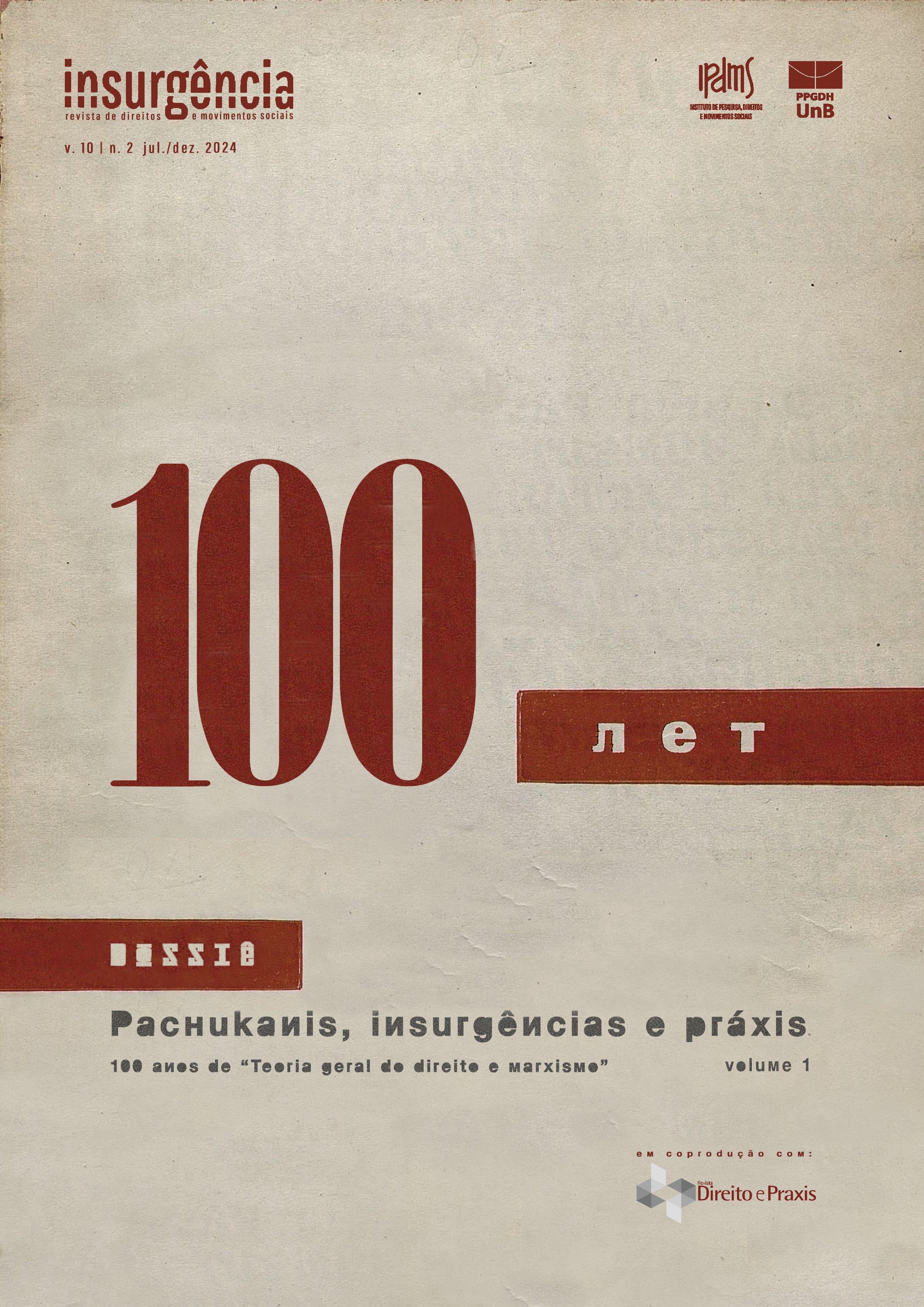The revolution of Pashukanis against the juridical form
DOI:
https://doi.org/10.26512/revistainsurgncia.v10i2.54342Keywords:
Legal-form, Legal fetishism, Juridical State, Meta-legal State, Extinction of lawAbstract
In commemoration of the centennial of the publication in 1924 of the seminal work of Eugeni Pashukanis, The General Theory of Law and Marxism, the author of this article proposes, first of all, to pay tribute to who has been, undoubtedly, the main Marxist theorist and philosopher of Law and present the revolution, both theoretical and practical, that he led against the juridical form in Soviet Russia between 1924 and 1936. Secondly, the article seeks to address not only the paradigmatic revolution that said work represented for Marxism in theoretical terms but also the subsequent further development of his ideas based on the concrete historical experience. Based on the recognition he received for the significant contribution that his work represented, Pashukanis led in those years what was known as the “School of the Law of the Exchange of Commodities” (also known as the “School of the Commodity-Form Theory of Law”), which became the most influential promoter of a cultural revolution in relation to Law. Said School distinguished itself in practice, above all, for its militant commitment to the Marxist thesis of the extinction of law, which marked its critical contributions to the development of legality under the New Economic Plan (NEP) and its insistence in the transitory nature of the use of the legal form during that period, compelled by the necessity imposed by the immediate circumstances that the revolution faced. This explains, to a large extent, the relevance of Pashukanian thought in times such as the present characterized by a crisis of the legal form as an expression of the crisis of its systemic matrix: the capitalist political economy. The article concludes with what was the tragic fate of Pashukanis and said School of the Commodity-Form Theory of Law in the face of the new trends in favor of the juridification of the Soviet State promoted by Stalin.
References
ENGELS, Federico. Carta a A. Bebel, en Marx, Carlos y Engels, Federico (1969). En: Obras Escogidas. Moscú: Editorial Progreso, 1875.
ENGELS, Federico. Del socialismo utópico al socialismo científico. En MARX, Carlos; ENGELS, Federico. Obras Escogidas. Moscú: Editorial Progreso, 1969
KAFKA, Franz. El proceso. Barcelona: Bruguera, 1984.
LENIN, Vladimir I. Sobre el ascenso a una alta montaña. Marxists.org [En línea]. Disponible en: www.marxists.org/archive/lenin/works/1922/feb/x01.htm.
LENIN, Vladimir I. A Contribution to the History of the Question of Dictatorship (Una contribución a la historia de la cuestión de la dictadura). Lenin Collected Works, v. 31, 1920.
LENIN, Vladimir I. El imperialismo, fase superior del capitalismo. En: Obras V. Moscú: Progreso, 1973.
LENIN, Vladimir I. Estado y Revolución. En: Obras VII. Moscú: Progreso, 1973.
LENIN, Vladimir I. La revolución proletaria y el renegado Kautsky. En: Obras IX. Moscú: Progreso, 1973.
MARX, Carlos; ENGELS, Federico. Obras Escogidas. Moscú: Editorial Progreso, 1969.
MARX, Karl. El capital: crítica de la economía política I. México: Fondo de Cultura Económica, 1999.
MARX, Karl. Escritos sobre la comunidad ancestral. La Paz: Vicepresidencia del Estado Plurinacional de Bolivia, 2015.
PASHUKANIS, Eugeni B. La teoría general del derecho y el marxismo. México, DF: Grijalbo, 1976.
PASHUKANIS, Eugeny. Lenin y la cuestión jurídica. Traducción de Víctor Romero Escalante. Crítica Jurídica Nueva Época, México, n. 2, 2020 [1925].
PASHUKANIS, Eugeny. Derecho Internacional. En: BEIRNE, Pierre; SHARLET, Robert (eds.). Evgeny Pashukanis, Selected Writings on Marxism and Law. Londres y Nueva York, 1980 [1926] (Traducido al español por Sergio Martín Tapia Argüello, Crítica Jurídica Nueva Época, México, n. 2, p. 367-382, 2020 [1926]).
PASHUKANIS, Eugeny. La teoría marxista del derecho y la construcción del socialismo. Traducido al español por Carlos Rivera Lugo. En: BEIRNE, Pierre; SHARLET, Robert (eds.). Evgeny Pashukanis, Selected Writings on Marxism and Law. Londres y Nueva York, 1980 [1927].
PASHUKANIS, Eugeny. Formaciones socioeconómicas, Estado y derecho. Traducido al español por Carlos Rivera Lugo. En: BEIRNE, Pierre; SHARLET, Robert (eds.) (1980). Evgeny Pashukanis, Selected Writings on Marxism and Law. Londres y Nueva York, 1980 [1932].
PASHUKANIS, Eugeni. La situación en el frente de la teoría jurídica. Sovetskoe gosudarstvo i revoliutsiia prava, n. 11-12, p. 16-49, 1930.
PASHUKANIS, Eugeny. Economía y regulación jurídica. Traducido al español por Carlos Rivera Lugo. En: BEIRNE, Pierre; SHARLET, Robert (eds.). Evgeny Pashukanis, Selected Writings on Marxism and Law. Londres y Nueva York, 1980 [1929].
PASHUKANIS, Eugeny. State and Law under Socialism. Traducción al español de Carlos Rivera Lugo. En: BEIRNE, Pierre; SHARLET, Robert (eds.). Evgeny Pashukanis, Selected Writings on Marxism and Law. Londres y Nueva York, 1980 [1936].
PREOBRAZHENSKY, Eugueni. La nueva economía. México DF: Ediciones ERA, 1976.
SHARLET, Robert. Pashukanis y la extinción del derecho en la URSS. Traducción al español de Carlos Rivera Lugo. En: FITZPATRICK, Sheila (ed.). Cultural Revolution in Russia 1928-1931. Bloomington & London: Indiana University Press, 1978.
STUCKA, Piotr I. La función revolucionaria del derecho y del Estado. Barcelona: Ediciones Península, 1974.
Published
How to Cite
Issue
Section
License
Copyright (c) 2024 InSURgência: revista de direitos e movimentos sociais [InSURgence: rights and social movements journal]

This work is licensed under a Creative Commons Attribution-NonCommercial-NoDerivatives 4.0 International License.
Creative Commons Atribuição-NãoComercial-SemDerivações 4.0 Internacional.
















